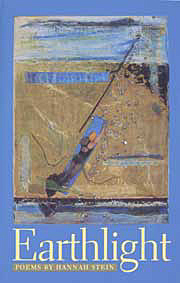
More Perihelion:
Bob Sward's Writer's Friendship Series
A quick list to poets featured in this issue:
 A Refined Attentiveness
A Refined Attentiveness
Earthlight, by Hannah Stein
88 pages. La Questa Press
by Kathleen Lynch
They tried / to comfort me but you can't pluck belief / from the air or just find it / in your soup. ("Progress Report," from Hannah Stein's Earthlight.)
The poems in Earthlight carry the authority of a penetrating, contemplative mind and an unflinching honesty. La Questa Press has delivered a new and significant pleasure to readers of contemporary poetry. Hannah Stein's Earthlight distinguishes itself as one of the finest volumes recently published. The fact that this is a "first book" makes Stein's accomplishment even more impressive.
Stein grapples with the conundrum we all face: how do we maintain hope and experience joy when confronted with public and private horrors.
The unforgettable opening poem, "Twin," bears an epigraph from Anne Frank's diary. In an expression of deep and intimate empathy, Stein writes, "We have caught / the same fevers at the same / moment: we wait to become real / to one another." and, "At the same moment that I / sat at my school desk, you were grasped / by the collar. Flung to earth..." This identification can be extended to any person "flung to earth" while we sit -- unknowing, unable or unwilling to stop some dark force. Addressing this reality is the moral work of our species. "Twin" poses the question we might each ask of ourselves:
"By now we've traveled far, rag after rag
thrown down, with toothbrushes,
with shoes and tins of shoe polish
still there, in mythic quantities. Small
heroic objects. And when I see them
when I see the pictures
from the camps
I don't marvel that I live, but ask
which one is me?
Though faced with the harshness and precariousness of a brute reality, Stein listens for "improbable music"("The Country of Hope"), works to find redemptive light. "Hunger Strike," dedicated to Bobby Jones, ends:
He foresaw new graves
dissolving to mud in rain, lines
of innocents. But he was forging a logic.
Each day more of him belonged to the light
and less to his keepers: what was not consumed
still burns.
Stein, too, is forging a logic: "What I want is knowledge," she avers in "Grace:"
In the midst of
tearing, being torn from --
our work goes on. Wrecking
the city, building over rubble,
till we are left
with the ordinary shape of things."
The "ordinary shape of things" is rendered by this writer in language of extraordinary surprise and precision. "I could sit / spellbound, watching a harpist / unreel her audible web." she claims in "Progress Report." And in "The Country of Hope," with droll attention to detail, she gives us this scenario: "The knife-thrower holds still, aims. / The woman's outline bristles with steel. / She's been sullen with him. He's thinking / of drawing blood."
The poems in Earthlight spring from a refined attentiveness. Stein regards what is before her with clarity and curiosity: unpacking a crystal goblet cushioned by styrofoam bubbles ("Fragile"); looking into a painting ("A Way Out of the Picture," "This Time, This Place," "Madame Monet in the Garden"); or transmuting images in a lake's surface ("Reading the Reflections Backward").
Stein's trajectory through a piece reveals a mind at work. The poems serve not only as vehicles for word craft and music, but for the thought process itself: a way of thinking deeply and differently. This is lucid work -- not a sterile, academic exercise; not an intellectual parlor game. There are no easy answers, no pat conclusions. Wry, joyful and sensual, Stein addresses large, difficult questions and the small tantalizing nuances of daily life.
Toward the end of "Progress Report," a woman passes the speaker in the street, a strange young woman "who walks as if a four-footed creature reared up / and miraculously discovered walking." A "hello" and nod from the speaker, "and she returns you a smile / that lavishes you with a cello's warmth..." Stein senses the import of this connection, this fleeting "concord" as "a vanishing personal song / that will flip darkness over to its other side, the frail bridge // on which we travel toward each other."
Hannah Stein works to "flip darkness over to its other side."She steps solidly into the arena with this manuscript. Readers will be eager for her next book. Earthlight is a triumph and a gift.
____
Back to Perihelion